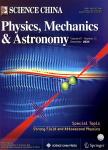Recent progress in defect engineering for kesterite solar cells
Recent progress in defect engineering for kesterite solar cells作者机构:Australian Centre for Advanced PhotovoltaicsSchool of Photovoltaic and Renewable Energy EngineeringUniversity of New South WalesSydney 2033Australia
出 版 物:《Science China(Physics,Mechanics & Astronomy)》 (中国科学:物理学、力学、天文学(英文版))
年 卷 期:2023年第66卷第1期
页 面:18-33页
核心收录:
学科分类:08[工学] 080502[工学-材料学] 0805[工学-材料科学与工程(可授工学、理学学位)]
基 金:supported by the Australian Renewable Energy Agency(Grant Nos.1-USO028,and 2017/RND006) the Australian Research Council(ARC)Future Fellowship Programme(Grant No.FT190100756) the ACAP Postdoctoral Fellowship Supported by Australian Centre for Advanced Photovoltaics(Grant No.1-SRI001)
主 题:thin film solar cells kesterite solar cells Cu_(2)ZnSn(S,Se)_(4)(CZTSSe,CZTS) defect engineering
摘 要:Kesterite Cu_(2)ZnSn(S,Se)_(4)(CZTSSe)thin film solar cells have been regarded as one of the most promising thin film photovoltaic technologies,offering a low-cost and environmentally friendly solar energy *** remarkable advances have been achieved in kesterite solar cells,the performance gap relative to mature thin film photovoltaic technologies such as CIGSe and Cd Te remains *** open-circuit voltage(V_(OC))deficit has been recognized as the main limiting factor to performance improvement,with undesirable intrinsic defects being a key culprit contributing to the low V_(OC).To realize the promise inherent in kesterite CZTS to become an earth-abundant alternative to existing thin film photovoltaic technologies with comparable performance,significant research effort has been invested to tackle the challenging defect *** this review,recent progress and achievements relevant to engineering improvements to the defect properties of the semiconductor have been examined and *** strategies include:(i)manipulating the synthesis process to obtain a desirable reaction pathway and chemical environment;(ii)introducing cation substitution to increase the ionic size difference and supress the related band tailing deep-level defects;(iii)applying post deposition treatment(PDT)with alkaline elements to passivate the detrimental *** advances obtained from work on kesterite solar cells may lead to future high performance from this material and may be further extended to other earth-abundant chalcogenide photovoltaic technologies.



